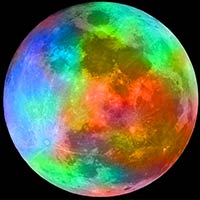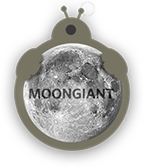
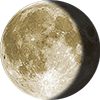 December 19 Waning Gibbous 79% |
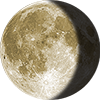 December 20 Waning Gibbous 71% |
 Waning Gibbous Illumination: 62% |
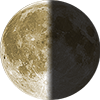 December 22 Last Quarter 52% |
 December 23 Waning Crescent 43% |
Moon Phase: December 21, 2024
On this day the Moon was in a Waning Gibbous. During this phase the Moon can be seen in the early morning daylight hours on the western horizon. This is the first phase after the Full Moon occurs. It lasts roughly 7 days with the Moon’s illumination growing smaller each day until the Moon becomes a Last Quarter Moon with an illumination of 50%. The average Moon rise for this phase is between 9pm and Midnight depending on the age of the phase. The moon rises later and later each night setting after sunrise in the morning.
Visit the December 2024 Moon Phases Calendar to see all the daily moon phase for this month.
Waning Gibbous Phase
The Waning Gibbous on December 21 has an illumination of 62%. This is the percentage of the Moon illuminated by the Sun. The illumination is constantly changing and can vary up to 10% a day. On December 21 the Moon is 21.04 days old. This refers to how many days it has been since the last New Moon. It takes 29.53 days for the Moon to orbit the Earth and go through the lunar cycle of all 8 Moon phases.
Today's Moon Sign: ♓ Pisces
The current zodiac moon sign is Pisces, positioned at 27.81° within the sign. The Moon entered Pisces on Loading... and will shift into Aries on Loading.... The zodiac moon sign represents the position of the Moon as it moves through the twelve signs of the zodiac. Each zodiac moon sign lasts about 2 to 2.5 days as the Moon travels through that part of the sky.
The 8 Lunar Phases
There are 8 lunar phases the Moon goes through in its 29.53 days lunar cycle. The 4 major Moon phases are Full Moon, New Moon, First Quarter and Last Quarter. Between these major phases, there are 4 minor ones: the Waxing Crescent, Waxing Gibbous, Waning Gibbous and Waning Crescent. For more info on the Moon Cycle and on each phase check out Wikipedia Lunar Phase page.
Phase Details for - December 21
Illumination: 62%
Moon Age: 21.04 days
Moon Angle: 0.50
Moon Distance: 401,818.59 km
Sun Angle: 0.54
Sun Distance: 147,152,489.40 km
Useful Moon Resources
Check the weather before a night of Moon gazing at weather.com
For a list of all the current meteor showers visit American Meteor Society
Waning Gibbous Moonrise and Moonset


